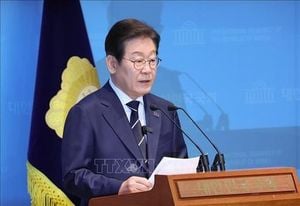Nearly missing the threshold to enter the Bundestag, the Bündnis Sahra Wagenknecht (BSW) is now considering legal action following its election result. With 4.97 percent of the vote, the party fell just 13,400 votes short of the five percent needed for parliamentary representation. This has raised significant questions about the legitimacy of the electoral process, particularly concerning the voting rights of Germans living abroad.
The party's top candidate, Sahra Wagenknecht, expressed her discontent at the press conference immediately following the election, stating, "When one party is kicked out of the Bundestag because it misses by 13,400 votes, it raises serious questions about the legal validity of the election result." She emphasized the issues faced by overseas Germans, noting the approximately 230,000 eligible voters who were unable to vote due to strict deadlines before the early election. Many of these individuals experienced logistical challenges, failing to receive their ballots on time, which could have played a pivotal role in the outcomes.
The BSW's experience during this election appears to echo their earlier successes; the party managed to enter several state parliaments last year. Despite this latest setback, co-chair Amira Mohamed Ali affirmed, "The BSW is here to stay, and we will continue to fight." Their confidence seems strong, even amid legal uncertainties surrounding their potential claims.
Legal experts point to the hurdles involved in contesting election results, noting the rigorous requirements necessary to prove legal violations. Professor Sophie Schönberger from the Düsseldorf Institute for Party Law commented, "There is no constitutional right to absentee voting, and I see little chance for success if they challenge the election solely based on the absence of overseas votes." Others, like constitutional lawyer Dr. Roya Sangi, echo similar sentiments, stating, "For legal action to proceed, there must be substantial evidence of specific electoral malpractice rather than just the mere closeness of the vote."
Wagenknecht also criticized the media narrative surrounding the BSW, alleging it was misrepresented as being aligned with pro-Putin sentiments and claiming, "We faced a systematic media campaign against us, which certainly influenced the election's outcome." The party's challenges included not only logistical issues but also the unfavorable media portrayal, as described by Wagenknecht, who accused polling institutes of deliberately underreporting the party's standing.
Following the election, Fabio De Masi, another prominent BSW member, speculated about the future consequences, saying, "I fear this election will occupy Karlsruhe for some time," referencing the possibility of the Federal Constitutional Court getting involved due to the circumstances surrounding overseas votes.
The percentage of votes received by the BSW raises important questions about voter engagement and outreach tactics. The BSW attracted many previous non-voters, which could suggest shifting political sentiments within the German electorate. According to exit polls, the BSW garnered approximately 400,000 votes from people who previously did not vote, indicating their messaging may have stirred interest among those disillusioned with traditional parties.
Despite these challenges, Wagenknecht remains optimistic about establishing the BSW as a new political force within Germany. She expressed during her post-election address, "While we did not succeed this time, it is by no means the end of our project. We will focus on building our party for the next election and aim to be back stronger by 2029."
The upcoming weeks are likely to be decisive for the BSW as they assess their legal options and seek to mobilize support for their claims. Party insiders reveal plans for internal discussions, indicating the potential for structural changes to bolster their position and broaden their appeal.
Looking forward, public interest remains high about how the BSW's situation will evolve. Depending on the legal outcomes, they could either reinforce their platform or face setbacks if their claims are dismissed. Much will hinge on whether they can translate their grassroots support and frustrations over the electoral process effectively, lodging significant challenges to the status quo.
For now, the BSW stands at a crossroads, grappling with its identity and future within Germany’s political discourse. The determination of Wagenknecht and her colleagues to challenge the election results signifies their resolve to assert presence and power on the German political stage.



